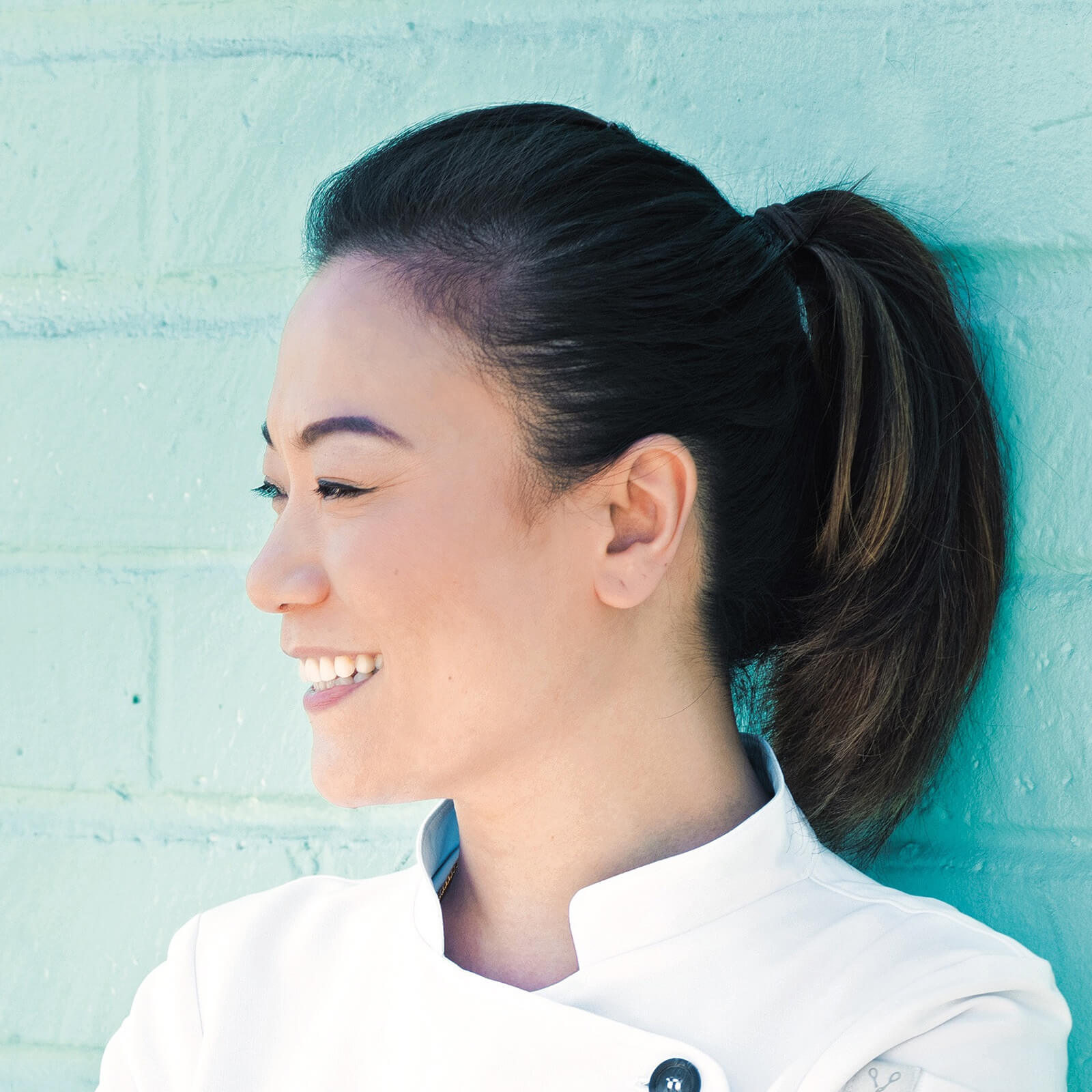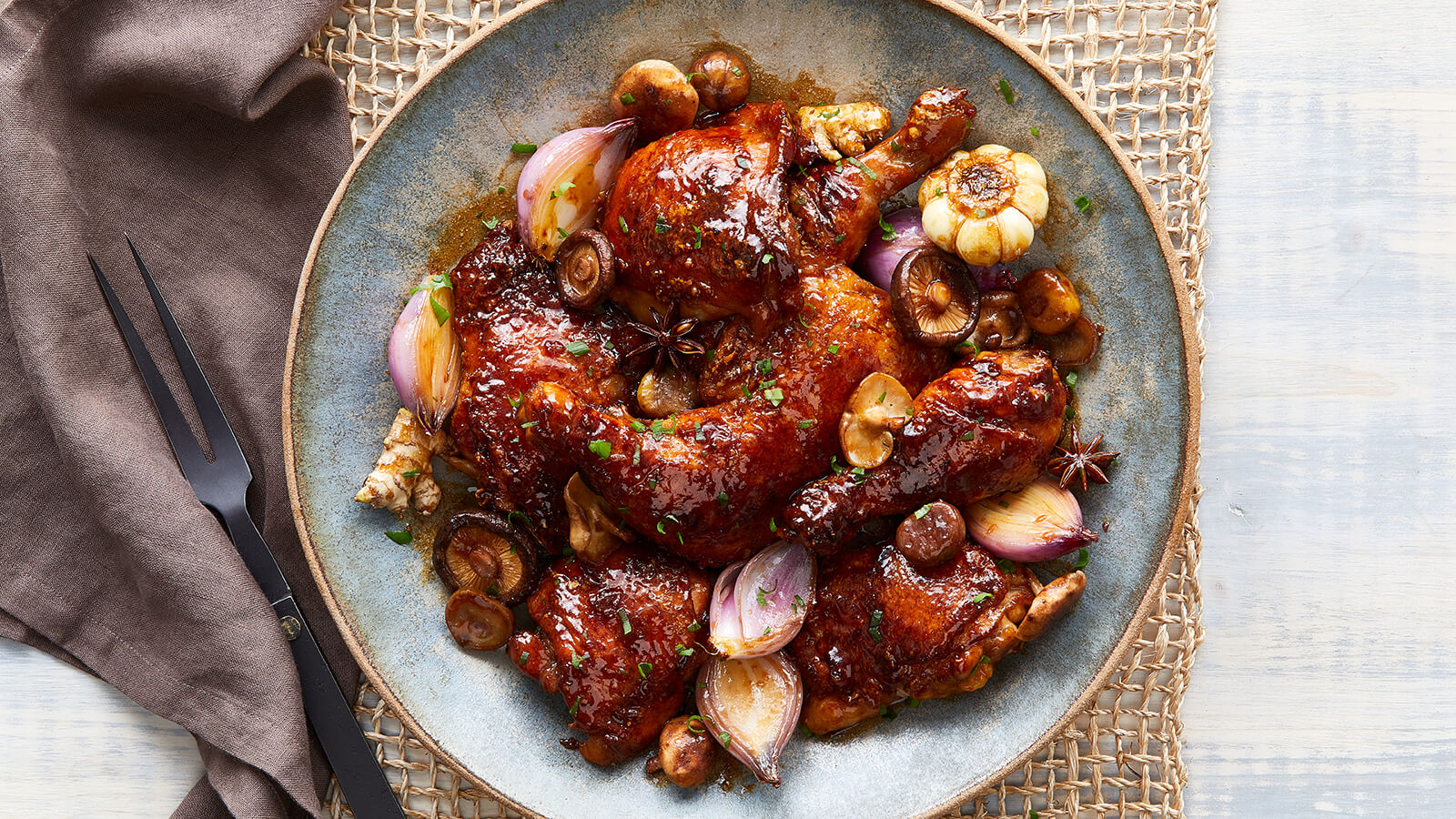Don't Miss Our Recent Livestream Events for Recipes, Tips & Seasonal FeaturesWatch Now >
|
Join The Ultimate Loyalty Experience®!Learn More >

Chinese Heritage Cooking with Chef Shirley Chung
 Shirley Chung's Caramel Chicken with Chestnuts
Shirley Chung's Caramel Chicken with ChestnutsBorn and raised in Beijing China, Shirley was exposed to international cuisine at an early age by her grandmother. Shirley immigrated to America at age 17 for college and left her career in high tech to follow her passion for food.
She is trained in classic French and Italian cuisine, and has worked and opened restaurants for Thomas Keller, Guy Savoy and Mario Batali. The California based restauranteur was a finalist on BravoTV's Top Chef!, and now showcases her Chinese heritage and personality in a modern fast casual, Ms Chi Cafe.
We were thrilled to chat with Shirley about her cookbook, Chinese American Cooking From My American, along with her experience immigrated to American, her favorite Thanksgiving recipe and more.
Q: You grew up in Beijing. What are some dishes you loved from your childhood and how has your culture helped shape your cooking today?
Northern Chinese cuisine is filled with dumplings, noodles and bings (round flatbreads, scallion pancakes, etc.). We eat a lot less rice than the southerners, and we always celebrate seasonal changes with food. As soon as kids can pick up chopsticks on their own (around age 4 or 5), they start learning how to fold dumplings with their mothers and grandmothers. I was classically trained in French cuisine, and I live and breathe Chinese cuisine and culture. I would describe my way of cooking as a modern American cuisine with a Chinese soul. I incorporate Chinese and western techniques with local, seasonal ingredients, creating elevated dishes that when you eat them, you feel like getting a hug from me. Since I was trained when I was 5, I am the dumpling queen of Los Angeles. My restaurant, Ms Chi turned out more than a dozen types of classic and new creative Chinese American dumplings like Jumbo Cheeseburger Potstickers and Vegan Garden Dumplings. I cook fine dining-style as well, but my dumplings, hand-cut noodles and scallion pancakes are the reasons people return to Ms Chi time after time.
Q: What was the biggest surprise to you about American food once you moved to The United States at age 17 and how has American cuisine influenced your cooking style?
When I first arrived in America, I was shocked that everything in the supermarket from vegetables, fruit to every single portion of everything—was giant. I used to roam around in the supermarket, reading all the labels (which is one of the ways that I learned English). Both of my parents were working in Silicon Valley and they always came home really late, so I started to cook dinner for my parents every night, using the new ingredients that I could purchase from an American supermarket. I also watched a lot of PBS and Food Network to learn how to use those ingredients as well as how to use a western kitchen with flat stove top and oven versus a Chinese wok. I still remember I impressed my parents by cooking spaghetti on a sheet pan in the oven to make Chow Mien. The way I cook is Chinese American.
Q: What was it like attending culinary school in San Francisco – how did you realize you wanted to become a chef?
I went to Culinary school at age 27, after spending 5 years working in the semiconductor sector in the Silicon Valley. I always loved food, started to make simple noodles and fried rice in elementary school, and hosted my classmates of more than 20 kids at my house and fed them noodles as young as 8! But growing up, becoming a chef was never an option in my parents’ eyes. My family has four generations of doctors and I was supposed to follow their footsteps and become a surgeon. I had a great career in the high tech world but always felt unfulfilled. Things I looked forward to the most were dining at all the best restaurants in the Bay Area and hosting parties on the weekends so I could recreate all the dishes I liked and feed my friends. When the market crashed in the early 2000s, I was in a startup and the company couldn’t secure its last round of funding for IPO. Facing uncertainty, my boyfriend (now husband), Jimmy, pushed me to rethink what I wanted and pursue my dream. I saw a commercial for California Culinary Academy, so I went to take a tour of the school, the moment I stepped into the building, the sound of chopping and bustling, the aroma of all the bake goods… hair on the back of my neck stood up, I knew, this was my calling. I officially started my culinary career at 28.
Q: You’ve opened restaurants for several high-profile chefs. Who has been the biggest influence on your career?
I was a blank slate when I started to work for Thomas Keller. I worked under Chef Mark Hopper and his work ethic and craziness is embedded in me. Then I learned to simplify the way I approached food and cooking when I worked for Mario Batali. It’s an elevated comfort food style which I love to create. But the chef who pushed me to be proud of my own heritage and believed in my Chinese cooking was José Andrés. When he asked me to be his opening head chef of China Poblano in Las Vegas, I had never professionally cooked Chinese cuisine. I only knew Chinese home cooking, so I had to learn how to use a professional wok from my Chinese sous chef. From China Poblano, followed by competing on Top Chef season 11, I found my culinary voice, instead of translating my chef bosses’ vision, I developed my own style.
Q: You were a finalist on Top Chef! What was it like competing on the series and what did you learn from that experience?
Everything you see on Top Chef is real! The short amount of time to think and plan, the stresses, the dramas and teamwork between chefs when competing… I loved every drop of it. I am a competitive person and I perform better under stress. I didn’t memorize any recipes before the competition and I was competing, cooking with reactions, every single one of my winning dishes was created on the spot. I realized 90% of the time that I was going back to the flavors and textures of my childhood in China even though I was using western techniques and American southern ingredients. I found my Chinese American self on Top Chef.
Q: Do you have any cooking tips that you swear by?
I believe in the power of a touch of acid to brighten and add complexity to anything. Also, finishing oils, such as a great extra virgin olive oil from Italy, sesame oil, charred onion oil, chili oil, garlic confit oil are some of the oils that I use every day. One last tip - Butter makes soy sauce better. Some of my soy glazed dishes are finished with butter, so, so good.
Q: Do you celebrate Thanksgiving and if so, is there a favorite dish you love to make for your family?
Thanksgiving is my family’s favorite holiday to celebrate together. As chefs, we normally work through all of the holidays. When I became a head chef, I would take turns with my chef team to take one holiday off per chef and Thanksgiving was always the holiday I chose. Instead of one whole turkey, we prefer duck and chicken and lots of options. My go to is a whole roasted duck with Chinese sausage and forbidden rice stuffing as the centerpiece, caramel chicken with chestnuts and a small prime rib on the side.
Q: Could you tell us about your recipe for Caramel Chicken with Chestnuts?
One of my favorite things in the fall and winter is roasted chestnuts. It doesn’t matter if I am on the street of Beijing, Milan or New York. If I see and smell them, I have to have them. They remind me of my childhood and holiday family time. When I make caramel chicken with chestnuts, from the sweet and savory aroma of caramel meets soy sauce, the bubbling murmur of chicken, chestnuts and mushrooms simmering together, the slow and low braising style of cooking, always put me in a warm and fuzzy feeling of the holidays with The Christmas Song- chestnuts roasting on an open fire…in my head.
Q: Where did you draw inspiration for your cookbook Chinese Heritage Cooking From My American Kitchen?
My cookbook is the journey of growth and discovery of myself as a Chinese American and a Chinese American chef. It has a collection of traditional Chinese dishes as well as my Chinese American creations. My goal is to get people to be less intimidated about cooking Chinese food at home with no special tools necessary.
Q: We understand that you are a strong voice against the hate AAPI communities have faced increasingly, even more so this year. Can you tell us about what strides you have made both personally and professionally to aid AAPI communities overcome the impact this has had on their businesses?
I have the platform to amplify Asian American voices and I learned how to not to be afraid and be louder and louder for my community. Because of the pandemic, the chef community became tighter and tighter, sharing ideas and policies a lot more than before. I was connected to many more independent chefs in Asian communities and realized that many of them are not aware or didn’t have the access to many aides. So, I invited them to join the Independent Restaurant Coalition, to help them keep up with all the new policies and aides, help them translate English to Chinese.
As an owner of a Chinese restaurant, we experienced discrimination and our business initially declined. We experienced racist attacks through pandemic firsthand, but the attacks of our elders sent my anger through the roof. Groups of my friends in the food world came together and successfully raised over 50k in a Club House (the new voice only social platform), LA Food Gang against Asian Hate event in March.
After the Atlanta shootings of Asian women happened, we turned anger into a call for action, asking allies to stand with us. We organized a series of events in May for Asian Heritage month - Popoff LA, pairing one Asian chef with an ally chef to collaborate and create a unique meal and all the proceeds were donated to a charity called “Off Their Plate,” who uses 100% of its funds to rebuild Chinese towns, help Asian woman chefs and other under serving Asian American communities. My next project is to create a series of Dumplings and Chinese food NFTs to bring awareness and donate the sales to StopAsianHate. I am passionate about food and innovations.


